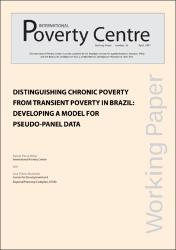Please use this identifier to cite or link to this item:
https://repositorio.ipea.gov.br/handle/11058/15254Full metadata record
| DC Field | Value | Language |
|---|---|---|
| dc.contributor.author | Ribas, Rafael Perez | |
| dc.contributor.author | Machado, Ana Flávia | |
| dc.date.accessioned | 2024-10-03T23:53:19Z | - |
| dc.date.available | 2024-10-03T23:53:19Z | - |
| dc.date.issued | 2007 | |
| dc.identifier.uri | https://repositorio.ipea.gov.br/handle/11058/15254 | - |
| dc.description.abstract | Although many studies have addressed poverty in Brazil, very few of them have analyzed the dynamic nature of this phenomenon. In order to fill this gap, this Working Paper seeks to identify the features that determine the permanence of poverty and the downward mobility into poverty of adults in urban areas. Due to the scarcity of Brazilian panel surveys, we use a ‘pseudo-panel’ obtained from PNAD, a cross-sectional National Household Survey. The probabilities of staying in states (poor or non-poor) and changing states (such as from poor to non-poor) are estimated with a bivariate probit for grouped data. Our analysis distinguishes between persistent and observed components that can condition the probability of being poor and helps identify the groups that are particularly affected by either transient or chronic poverty. We find that between 1995 and 2003, 73 per cent of urban relative poverty in Brazil was chronic and most of this level was due to an initial persistent condition of poverty. In other words, most poor people are subject to poverty mainly because of their past persistent condition of poverty. These findings suggest that an effective policy of reducing poverty should involve not only a systematic multi-sectoral approach, such as improving human capital and the access to public services, but also an extensive programme of income redistribution. | en |
| dc.language.iso | en | |
| dc.title | Distinguishing Chronic Poverty from Transient Poverty in Brazil: Developing a Model for Pseudo-Panel Data | en |
| dc.type | Working Paper | |
| dc.rights.holder | International Policy Centre for Inclusive Growth | |
| dc.rights.holder | United Nations Development Programme | |
| dc.location.country | Brasil | |
| dc.description.physical | 34 p. : il. | |
| dc.rights.type | Licença total exclusiva | |
| dc.rights.license | O texto e dados desta publicação podem ser reproduzidos desde que as fontes sejam citadas. Reproduções com fins comerciais são proibidas. | |
| dc.subject.keyword | Chronic Poverty and Transient | |
| dc.subject.keyword | State Persistence and State Transition | |
| dc.subject.keyword | Endogenous Switching Probit Model | |
| dc.subject.keyword | Pseudo-panel | |
| dc.subject.keyword | Brazil | |
| ipea.access.type | Acesso Aberto | |
| ipea.researchfields | N/A | |
| ipea.classification | Desenvolvimento Social | |
| ipea.classification | Cooperação Internacional. Relações Internacionais | |
| ipea.classification | Direito. Legislação | |
| ipea.classification | Demografia. População | |
| Appears in Collections: | Publicações do IPC-IG | |
Files in This Item:
| File | Description | Size | Format | |
|---|---|---|---|---|
| en_IPCWorkingPaper36.pdf | 582.26 kB | Adobe PDF |  View/Open |
Items in DSpace are protected by copyright, with all rights reserved, unless otherwise indicated.

